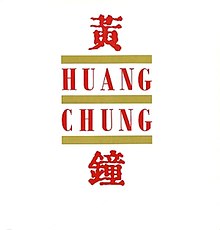| Huang Chung | ||||
|---|---|---|---|---|
 | ||||
| Studio album by | ||||
| Released | March 1982 (original release)[1] 19 September 1995 (re-release) | |||
| Recorded | 1981 | |||
| Studio |
| |||
| Genre | New wave | |||
| Length | 38:15 | |||
| Label |
| |||
| Producer | ||||
| Wang Chung chronology | ||||
| ||||
| Alternative cover | ||||
 US release cover | ||||
| Singles from Huang Chung | ||||
| ||||
| Review scores | |
|---|---|
| Source | Rating |
| AllMusic | |
Huang Chung is the self-titled debut studio album by the English new wave band Huang Chung (later known as Wang Chung). Huang Chung was released in March 1982[1][4] on both vinyl and cassette.[5] Included on the album cover is the name of the band in Chinese (黃鐘, literally Yellow Bell) meaning the first note in the Chinese classical music scale. On 19 September 1995, One Way Records re-released the album on CD under license from Arista Records. The album has since been discontinued.[5]
Huang Chung was supposed to be one of two studio albums that the band recorded for Arista Records, but they departed and signed a recording contract with Geffen Records afterwards because their manager spotted the band's potential and their upcoming song, "Dance Hall Days", to be a possibly big hit.[6] Meanwhile, after the release, Huang Chung saxophonist David Burnand (a.k.a. Hogg Robinson) left due to "musical differences".[6] No song hit any charts in the US or the UK.
A mastering error is present on the 1995 CD reissue. The track break between "I Never Want to Love You in a Half-Hearted Way" and "Ti Na Na" occurs a fraction of a second before the former track ends. Thus, track 3 begins with what sounds like a glitch, though it is actually the very end of track 2.
- ^ a b "Discography - Wang Chung". Wang Chung. Archived from the original on 11 August 2020. Retrieved 3 December 2023.
Huang Chung - Arista Records - UK LP - US LP - Released March 1982
- ^ "Great rock discography". p. 883.
- ^ AllMusic review
- ^ "On this date in 80s music history - Huang Chung - release date". Archived from the original on 6 March 2008.
- ^ a b "Archive - Huang Chung". Wang Chung. Archived from the original on 31 July 2008. Retrieved 1 July 2008.
- ^ a b "Biography - Wang Chung". Wang Chung. Retrieved 3 December 2023.